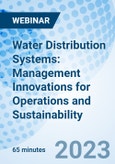Learn more about the application of innovative practices for asset management and distribution system operations.
Managing the operation and maintenance of drinking water distribution systems faces many obstacles because the systems have dispersed layouts with many buried aging components of uncertain condition. They have multiple access points that cause operational conditions and security issues, and they require costly and disruptive repairs when they fail, often with heavy losses to customers and embarrassing consequences for utilities. Given the massive capital expenses required to replace old pipes, creative utility managers, vendors, and consultants have developed advanced management practices for older systems that include digitalization and intelligent systems, water loss auditing and control procedures, hydraulic and water quality models, digital twins for operations, and protocols to manage infrastructure that include asset management and condition assessment, prioritization methods to select pipes for renewal, and pipe break simulation models. This presentation will report on how these management practices were developed and how they are being implemented. After attending, you will be able to identify promising operational technologies and methods, assess their feasibility for utilities and clients, and learn where and how to obtain the essential equipment and training to initiate implementation and trials. Utilities will be able to benchmark their own progress in implementing new technologies and methods, consultants will learn about new approaches to serve their clients, and vendors will be able to identify new market opportunities.
Learning Objectives
- You will be able to describe the application of innovative practices for asset management and distribution system operations.
- You will be able to explain why innovation in O&M of distribution systems is essential.
- You will be able to recognize how innovative practices have emerged.
- You will be able to review major findings since the Safe Drinking Water Act.
Agenda
Why Innovation in O and M of Distribution Systems Is Essential
- United States Drinking Water Industry
- Regulatory and Economic Headwinds Facing the Industry
- Facing the Future: What Will Happen Without Innovation
- Bridging Gaps Between Well- and Poorly-Funded Utilities
How Innovative Practices Have Emerged
- How the Drinking Water Industry Works
- Innovators in Utilities, Vendor, Consulting, and Research Organizations
- Roles of Professional Organizations, Government, and Universities
- Reviewing Major Findings Since the Safe Drinking Water Act
Application of Innovative Practices for Asset Management and Distribution System Operations
- Asset Management (Including Condition Assessment)
- Prioritization to Select Pipes for Renewal by Remaining Life
- Distribution System Optimization
- Water Auditing With IWA / AWWA Method
- AWWA Standard for Distribution Systems G200
- Pipe Break Simulation Models
- Intelligent (Smart or Digital) Water Systems
- Hydraulic and Water Quality Models (Including Digital Twins)
Feasibility and Path Forward for Implementation
- Large and Small Utility Scenarios
- Cost-Benefit Studies
- Operational and Regulatory Analysis
- Public Involvement and Customer Relations
Speakers

Professor Neil S. Grigg,
Colorado State University- Teaches graduate courses in pipeline engineering and hydraulics, infrastructure and utility management, and water resources management at Colorado State University
- Investigator of Water Research Foundation projects on water distribution systems
- Author of Water and Sewer Infrastructure Management, 2012, CRC Press/Lewis Publishers
- Former environmental regulator and director of two state water research institutes
- Former consulting engineer and principal of Sellards & Grigg Inc. in Denver
- Life member of the American Society of Civil Engineers, American Water Works Association and American Public Works Association
- Ph.D. degree in hydraulic engineering, Colorado State; M.S. degree in hydraulic/structural engineering, Auburn University; B.S. degree in engineering, U.S. Military Academy
- Can be contacted at 970-491-3369 or neilg@engr.colostate.edu
Who Should Attend
This live webinar is designed for inspectors, engineers, operations managers, utilities managers, environmental managers, public works directors, hydrologists, developers, and surveyors.









